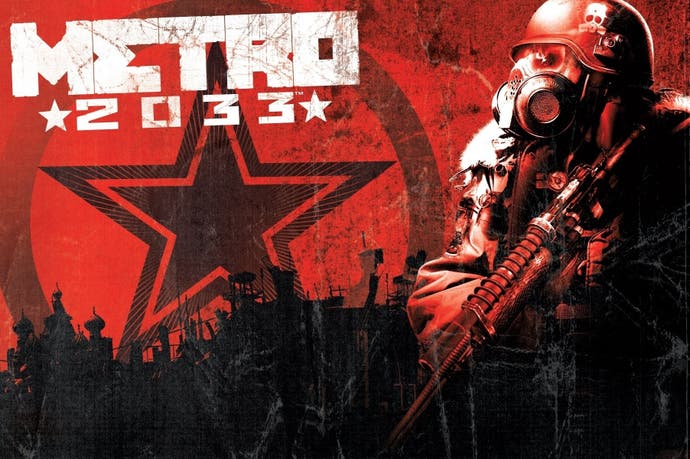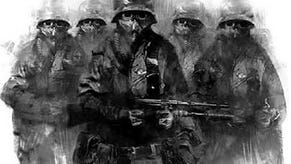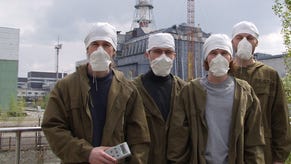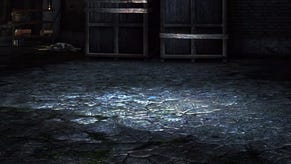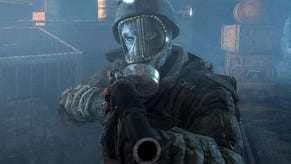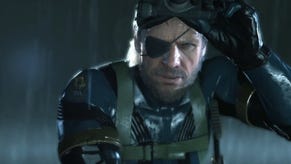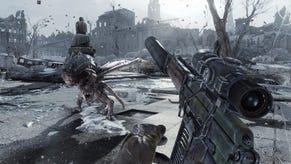Metro 2033 retrospective
Going underground.
Metro 2033 is not a game that deserves a sequel. Too often the game stumbles in its quest to combine elements of shooter, stealth and horror, never confident enough in any one category. The story demands no clear continuation.
But THQ president Danny Bilson held a kernel of truth when he said the game was a "flawed masterpiece." He's right, of course - for all its flaws, Metro 2033 drenches you in a world so wet with atmosphere other post-apocalyptic games look childish by comparison. At its worst, Metro 2033's crime is that it passes over these elements, making it too indistinguishable from the brown-coloured game brigade. At its best Metro is a focused and nuanced exploration of death, war and faith.
The story is simple stuff. Two decades after a nuclear blast devastated Moscow, 40,000 survivors who made the underground metro their home battle food shortages, health problems, attacks from radiation-soaked mutants and even their own kind, who have adopted radical political beliefs. Old habits die hard in the subway. But rather than soak you in exposition, Metro's strengths come in revealing how much you don't know and then teasing you in your ignorance.
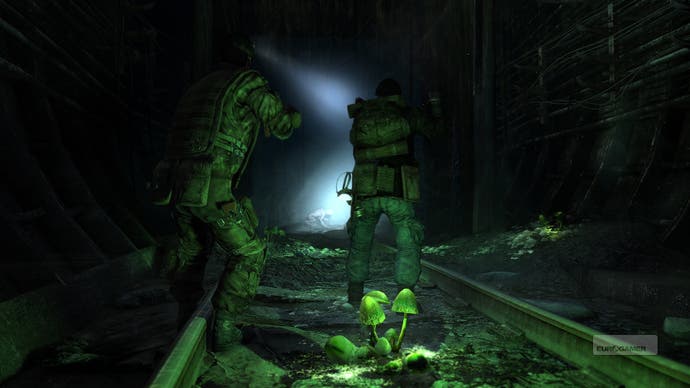
The lack of framework exposition during the game's beginning seems a trend of the Eastern European development scene, especially those focused on the PC. Here, the game is more important than the studio, the story always considered a single piece of fabric with as much detail in the stitching as possible. But the humble Moscow setting is just another reason the player has to be afraid. To the player familiar with Moscow, having a game set in one of the world's largest metro systems is something of a novelty. The insulated, casual player in the west is confronted by their prejudice. Years of western propaganda have already branded Russia as a hostile wasteland. The game takes advantage of fearful Cold War memories which don't actually exist.
The lack of exposition serves to underline Metro's nihilistic philosophy. You don't know what caused Moscow to burn in flames, and the game doesn't attempt to help your ignorance. As you wake, there is no prologue detailing international relations gone wrong. There is only the dark, dank reality of your dirty room. If Metro 2033 gets a few things completely right, it's the conviction through which that philosophy injects itself through the game's linear structure - quite literally on rails. It's not interested in what came before. There is only what is, and what is to come.
It's because of this structure Metro doesn't attempt to "push" you forward, but rather invites you, teasing you in an atmosphere so rich you can't help but want to see more. Here's why: the game features so much life within its first five minutes than most can muster in 20 hours.
As you walk through your home station for the first time, you believe the world is alive. Children run around your feet, one strokes a guitar. Old men laugh. The chatter of the station bounces off the walls, never unrealistically expanding beyond the number of people in your vision. They are engaged. It's a testament to the voice acting, which appears casual rather than sounding like forced casual banter repeating itself over and over again. Later, as you make your way from the station, three rangers share a joke as you travel past. You can't help but wonder if they're laughing at you.
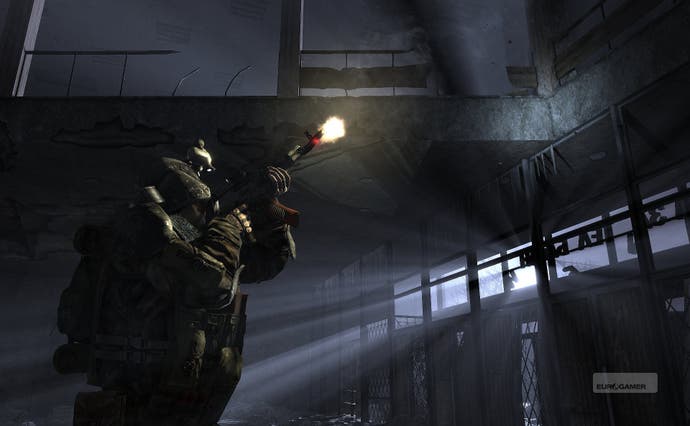
This is an accomplishment a game such as Fallout 3 could never really muster. You believe Washington DC is empty because there is nothing in it. Instead, Metro's sense of dread doesn't come from the fact you live in a post-apocalyptic world. Rather, the game goes through pains to convince you society has evolved. It doesn't want you dwelling on the fact you're alive - that's no miracle. The station, the metro, is life. There are rooms, hospitals, pig pens. There are desk lamps and a sense of order. The fact people actually carve out a life for themselves in such dismal settings is horrifying enough.
Playing through the game again after nearly three years, I'm struck by how bleak and depressing the entire experience is, especially during the frequent periods in which the game has you stop and take notice of your surroundings. Drenched in darkness, there are pieces of garbage and debris everywhere, a memory of a life the game doesn't want you to remember.
Yet it's here, in these moments, rather than in Metro's clunky combat and sometimes confusing level design, that the game reveals a powerful understanding of death and life. With so few bullets available, you're left to scavenge the bodies that are littered throughout the tunnels. But there's a strange sense of melancholy. With their gas masks attached, and so few bullets left, you can almost see how they died. They aren't draped over one another in battle, with dried blood pooled as many shooters often portray the fallen. They're slumped in a corner. They died of something you cannot see.
It's little wonder the game makes you look at their faces to take off their masks. The dead are gone, there is only now - but look, the game says. Metro has a fascinating obsession not with the world that came before, but others who have walked the tunnels. Your companions wallow about the nature of death, and life, and speak of the ones who preceded you. They appear as silhouettes on the wall, their cries a distant echo. Your partner laments: "When a soul leaves the body, it has nowhere to go, and must remain here, in the Metro. A harsh, but not undeserved atonement for our sins, wouldn't you agree?"
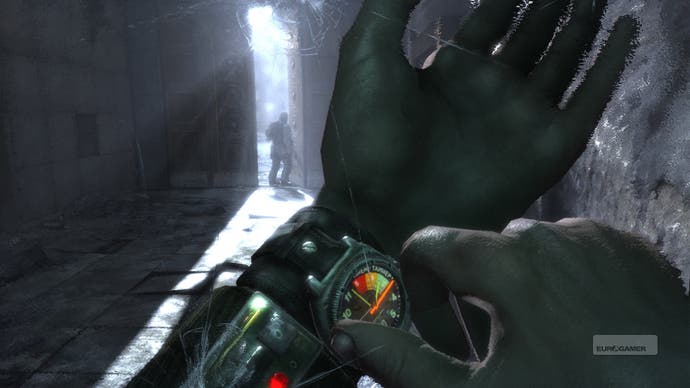
Metro creates a symbiotic, almost theological, relationship between the tunnel and the player. They are both saviour and enemy. Mercy and judgment. During the beginning of the game, when you're forced to pass through a service tunnel - where you first encounter the "Dark Ones" - your companion grows hesitant. "I just don't like it," he says. Metro's characters treat the tunnels with the sort of reverence usually reserved for a deity.
The only shame is that it throws the concept at you so forcefully as to dilute the impact. Yet it doesn't always fail. As you work through the tunnels, attempting to escape the war between the tunnel-dwellers who have accepted radical political views of National Socialism and Communism, you hear words and exchanges that are a clear judgment from the game - or the tunnels - about the futility of it all. A commander just wants to go home. A traitor about to be shot pleads for his life. It's heavy handed, but at least thematically whole - Metro shows you all too often the futility of war and the inevitably of its destruction, whether above or under ground.
As much as some of Metro 2033's forced, there's plenty that's frustratingly subtle. Instead of simply giving you a choice as to whether or not you kill the "Dark Ones" at the end of the game, a series of seemingly unimportant decisions dictate which ending you see. If you neglect the kind or gentle actions, you see the violent ending. If you show compassion, a more peaceful ending is granted. But the importance of these decisions is never broadcast. It's a rare game that reflects the gamer's personality back on themselves.
It's a shame the game's strength is also its weakness. Had Metro had been made before the internet age, you'd never know the other ending existed. Its ending is diluted by the very aspect that makes it shocking. Although, the decision to avoid violence is obvious from the start, isn't it? As the game questions your necessity to shoot by placing a value on bullets, the notion you should avoid violence is clear. As Artyom's companion says at the game's beginning:
"Did you ever think we'd end up in a place like this? Not knowing whether we were about to save our world... or send it straight to hell?"
With Metro: Last Light coming later this year, there is a risk 4A Games will opt for more bombastic entertainment in order to draw new players. Such a move would be a mistake, if it comes at the expense of the game's experimentation. Metro 2033 never needed to show you a nuclear explosion to tell you the world is dead.
